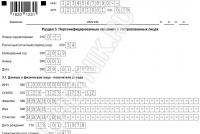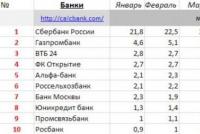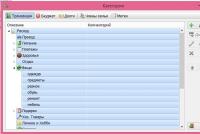Penalty for non-payment of rent. Law on penalties for public services. Penalty accruals for HOAs, as well as housing cooperatives
Every year utility bills go up. 2017 was no exception for citizens of the Russian Federation. At the beginning of last year, a new law was adopted to tighten the liability for debtors to pay for housing and communal services. What the new law implies and what punishment is provided for persistent non-payers, we will consider later in the article.
The procedure for paying utility bills is regulated by the Housing Code. According to article 153 of the LC RF, this is the responsibility of every citizen, including legal entities who rent any premises. Housing and communal services include:
- payment for hot and cold water;
- the product of payments for electricity (study);
- payment for heating;
- and gas supply.
According to Article 155 of the Housing Code of the Russian Federation, there is a certain period during which utilities must be paid. Payment is made every month until the 10th day upon receipt of the relevant payment document. Military personnel, veterans and other categories of citizens enjoy payment benefits.
The maximum delay in paying for utilities can be 31 days. Previously, penalties were charged for a month of delay, now penalties are charged on the 31st day of the absence of payments. To use installments and deferments, good reasons for delaying payment are required. These include:
- serious disease;
- loss of position or sole breadwinner.
In any of the above cases, documentary evidence of the facts will be required.
What are the risks of non-payment of utility bills?
The new law on non-payment of utility bills provides for the accrual of penalties to debtors who do not pay their bills on time for utility bills. Federal Law No. 307 considers the procedure for calculating penalties for non-payment. The law was amended to improve consumer discipline.
The main methods of dealing with malicious non-payers are:
- penalty charge;
- introduction of restrictions or suspension of the supply of public services;
- The last resort is eviction from the apartment with the help of the court.
Consider the above methods of punishment for late payment, carried out by utility providers, later in the article.
The amount of penalty according to the law
The most common form of punishment is the imposition of fines. A penalty is a penalty for a long delay in paying utility bills. According to federal law No. 307, citizens who are overdue in payment by more than a month will be subject to penalties. You can pay the bill within 31 days after receiving the receipt.
The total amount of the penalty depends on the size of the debt and the number of days of non-payment, as well as the refinancing rate of the Central Bank of Russia.
Rent debtors who are individuals should remember that from days 31 to 90, 1/300 of the refinancing rate is charged for each day the receipt is not paid. And from 91 days the penalty will increase to 1/130 of the rate of the Bank of Russia. The current rate is 9%.
The legal status of the utility consumer affects the calculation of late fees. For organizations supplying heating, water, etc., the following fine will be charged:
- from the 1st to the 60th day - 1/300 of the interest rate of the Central Bank;
- from 60 - 90 - 1/170;
- from 91 days - 1/130 of the discount rate.
For legal entities, the fine will be charged at the maximum discount rate - 1/130. If the debt for the apartment can be paid through the terminal, then there is no penalty. Payment can only be made at a branch of Sberbank or at a management company, which should be done as soon as possible.
Accrual of interest can be avoided if a citizen has to leave for another city for a long period. The interested person is obliged to write an application to the management company and notify of this fact. The deferred payment will be valid for six months. If an extension is required, then the next application is sent by mail.
What are the suppliers entitled to?
In addition to charging penalties, utility providers have the right to resort to other measures to punish debtors. For a delay in payment of more than 3 months, it is envisaged to cut off or restrict the supply of gas, electricity, water for non-payment of utilities. The supplier has the right to act according to this regulation until the receipt of funds from the debtor. Notification of the defaulter is made in writing by mail. After 3 days, if the notification is ignored, the notification is made personally by the authorized person.
Eviction from the apartment for debts is also possible. However, it applies to citizens who rent housing. ATevict the owner legally prohibited from a privatized apartment. The impetus for this procedure is not the total amount of debt, but the time period for not paying utility bills - more than 6 months.
Where to complain about illegal outages?
The Federal Law on rent provides for utilities that do not have the right to turn off, even if payment is not received - heating and cold water supply.
Shutdown of any kind of utility services without proper warning from suppliers illegal! This illegal action can be appealed. A complaint can be sent to the management company or the HOA. If it was not possible to reach a mutual agreement, the claim is sent to the state housing inspectorate or Rospotrebnadzor. This is followed by a written application to the prosecutor's office and the court.
Utility providers may be held administratively and criminally liable. For violation of the regime for providing the population, the housing and communal services impose a fine on officials - 500 - 1,000 rubles, and on legal entities - 5,000 - 10,000 rubles. For arbitrariness and causing damage - a fine of up to 80,000 rubles is charged, or compulsory work is carried out for 180 - 240 hours, or corrective labor from 1 - 2 years, or arrest for 3 - 6 months.
Payment arrears could be the reason for the disconnection from the supply of utilities. If the debtor received the notice on time and the fact of late payment is recognized by him, then the only solution to the problem is the payment of funds. When the debt is repaid, the supply of electricity, gas, water is carried out within two days.
Last update: 01/30/2020
Today, not all citizens manage to fully and timely pay utility bills. Many Russians have a difficult financial situation, and there is no money left to pay for services. However, not everyone knows that delays in payments for more than 1-3-6 months can lead to the accrual of penalties, and the housing management organization goes to court to collect the debt. And then the bailiffs will seize money and property. In some cases, the debtor may suffer the fate of eviction from the apartment.
Liability for non-payment
If you are overdue payment for utility services by more than one month, what will happen, what does it threaten?
Penalty will be charged on the main payment
Penalties begin to accrue from the second month of delay. The rights of public utilities to their accrual are reflected in paragraph 14 of article 155 of the Housing Code. Penalty is charged for each day and its% varies depending on the number of months of non-payment:
- 1/300 of the refinancing rate of the Central Bank of the Russian Federation - from 2 months to 3 months
- 1/130 for the next - starting from the 4th month.
Penalty amount = debt * number of days of delay * 1/300 * refinancing rate.
The size of the current rate can be found on the website of the Central Bank www.cbr.ru. Since the beginning of 2016, the rate is 11%.
Example: The total debt for services as of March 10, 2020 is 2,400 rubles. Of these, 1200 rubles. for February, and 1200 rubles. for January 2020. You made the payment only on March 20, 2020 (the number of days of delay is 10).
Penalty calculation: (1200 * 10 days / 300) * 11% \u003d 4.40 rubles.
Shutting off the use of utilities
Temporary restriction or disconnection from the use of utilities (gas, electricity, hot water, intercom services) until the debt is paid off. The debtor is threatened with this measure if the rent debt is more than three months.
How to apply the restriction:
- the debtor is notified in person or in writing (by post);
- if the debtor ignores the notification, the contractor personally notifies the consumer after 3 days and disconnects, if technically possible.
What utilities cannot be disabled?
- heating;
- cold water supply;
The resumption of the work of utilities is carried out no later than 2 days after the payment of the debt for services or the signing of an agreement on debt restructuring (see).
Sending a case for debt collection to court
The public utilities have the right to start a lawsuit to recover the housing and communal services debt from the moment they are convinced that the user has stopped making payments, first:
- the debtor is notified of the resulting debt in person or in writing (see);
- offer to pay the debt voluntarily within 30 days or enter into an agreement to repay the debt;
- in case of refusal or non-payment, a package of documents is prepared and sent to the court. much simplified and now, when submitting documents to the court, a positive decision is made in absentia within 5 days by court order.
The price of the claim may increase significantly, since it will include not only the total amount of the entire debt and penalties for the entire period of delay, but also legal costs.
Ways to collect a debt after the entry into force of a court decision
Voluntary order
The debtor may be offered to pay the debt in full at a time, or to conclude an agreement on debt restructuring (as a rule, it is concluded for a period of 6 months, but can be extended). This agreement is the most advantageous option, since it allows you to pay off the debt over a certain period, in equal installments, and not the entire amount at once. The form of the restructuring agreement is drawn up by the public utilities, based on the application you submitted.
Sample application for debt restructuring for housing and communal services
Head of UK "Zarya"
Antonov A.S.
from Yakimov S.T.
residential address: Mirny, st. Unions 31-2
tel.34-37-21
Statement
I ask you to consider the issue of concluding an agreement with me on the restructuring of debt for the use of services (indicate the type of service: heating, sewerage, water supply), for a dwelling owned by me on the right of ownership, located at the address: Mirny, st. Unions 31-2.
As of March 1, 2020, the debt is 46,341 rubles. My last payment was made in October 2019.
The reason for the lack of payment is a reduction from work, a difficult financial situation.
Date__________ Signature_______________
Enforced order - with the help of bailiffs
Recovery by a bailiff can be made from funds from:
- able-bodied population: by sending an executive document to the main place of work, and by combining;
- pensioners: by seizing pensions and other incomes;
- Disabled people: housing and communal services debt can be recovered from the disability pension, except in cases where the person is deprived of legal capacity.
Important! The amount of monthly deductions from earnings or other income cannot be more than 50% of the total monthly income (Article 99 of the Federal Law).
Other measures most commonly used by bailiffs:
- seizure of property (including money, securities, current accounts, property in the apartment);
- seizure of seized property and sale at auction;
- introduction of restrictions on leaving the Russian Federation;
- introduction of restrictions on registration actions with property.
Forced eviction for debts on utility bills
Can they be evicted from an apartment for a debt on a communal apartment? Eviction for debts is a separate requirement of a statement of claim by representatives of the public utility. If, after the entry into force of the court decision, the debtor continues to accumulate debt, does not comply with the requirements of the restructuring agreement, and the Federal Bailiff Service of the Russian Federation fails to recover anything from him, the time has come for this extreme measure - eviction.
Check-out procedure:
- written notification of the debtor about the possible application of the eviction procedure;
- drawing up a lawsuit in court for the forced eviction of the debtor;
- after the court decision, the person will be given 7 days for voluntary eviction, and then a forced order is carried out.
Eviction from a privatized apartment- if a person has other housing suitable for living, he can be evicted for debts. The right of the owner is protected by art. 446 of the Code of Civil Procedure of the Russian Federation, which says that in the absence of other suitable housing, it is prohibited to foreclose on the only housing, and a person cannot be evicted to a hostel or social housing. Bailiffs have the right to arrest, describe, and then sell at auction any property in the debtor's apartment, and belonging to him personally.
Eviction from council apartment- the possibility of eviction from municipal housing, provided for by Art. 90 LC RF under the following circumstances:
- the debt for housing and communal services is more than six months, and the reason for the lack of payment is not valid (loss of a job, a serious illness requiring treatment costs, loss of a close relative (burial costs), compensation for material damage according to executive documents);
- provision of other housing for social rent that meets the requirements for living in terms of area and sanitary standards.
- the responsible tenant (with whom the contract has been concluded), as well as members of his family, are subject to eviction.
Check-out from the hostel- an employment contract under which a citizen lives in a hostel is signed for a certain period (for the duration of work, study, service). The owner of the hostel may be an organization, municipality. The rights and obligations of the tenant under such an agreement coincide with the social lease agreement. Therefore, the landlord has the right to evict the debtor for debts that have arisen for more than six months (clause 1, part 4, article 83 of the LC RF), without providing other housing, and after a court decision.
Joint and several liability for debts for utilities
How to collect debts from citizens living together with the owner or responsible tenant, under a contract of employment or social tenancy? If it is impossible to pay for a communal apartment by the tenant (owner), the plaintiff (representative of the resource supplying organization) has the right to recover the debt from any of the able-bodied persons living together with him. This is called joint and several liability.
Responsibility is provided for all persons:
- If the apartment is owned- if the owner of the apartment cannot or does not want to voluntarily repay the debt with his own funds, the law obliges to repay the debt by other capable family members living with the owner (spouse, children, parents, other persons settled in the premises with the consent of the owner) art. 31 LCD RF.
- If the apartment is in shared ownership- the obligation to pay can be assigned to each owner separately, by separating personal accounts and concluding contracts for maintenance and repair for each owner.
- If the premises are occupied by persons under a lease agreement- the tenant's family members are subject to similar obligations to pay for the use of services, that is, joint and several liability under the terms of the rental agreement. At the same time, persons living together with the tenant must be indicated at the conclusion of the contract (Article 69 of the LC RF).
Statute of limitations for utility bills
As a general rule, the limitation period allowed for the collection of debt for housing and communal services is three years. Judicial practice shows that such claims are satisfied by the court, and the bailiffs, by their actions, can overshadow the life of the debtor for an even longer period. Therefore, it is better to pay debts immediately than to accumulate them.
If you have questions about the topic of the article, please feel free to ask them in the comments. We will definitely answer all your questions within a few days.
Establishes that utility bills must be paid no later than the 10th.
The past month has already been paid, for these types of services there is no advance system.
The debt begins to form from the 11th, if the payment has not been made in full or is completely absent.
At the HOA meeting, the payment date can be changed at the initiative of the management or by the majority of the tenants.
Legal justification
Dear readers! The article talks about typical ways to solve legal issues, but each case is individual. If you want to know how solve exactly your problem- contact a consultant:
APPLICATIONS AND CALLS ARE ACCEPTED 24/7 and 7 days a week.
It's fast and IS FREE!
The procedure for calculating, calculating and paying for utilities is regulated by several legislative acts of the Housing Code.
To find information, you will need to refer to article No. 153, 154,.
Payment in installments
To do this, an agreement is concluded with the management company, which specifies the conditions for restructuring the rent debt.
But there are a few things to keep in mind:
The management company may terminate the contract unilaterally if the debtor does not make payments on time or delays in paying the current debt.
Consequences of debt
Main:
- Penalty calculation.
- Disabling the resource, termination of the contract for the provision of utilities.
- Arrest of property.
- Confiscation of property, including apartments.
In the first three months of non-payment, utilities do not take action.
From the fourth month on the postal and / or e-mail address of the debtor, letters begin to arrive demanding payment of the debt.
Peaceful solutions to the problem are offered for 3-5 months, during which notifications are sent, utility workers come for a personal conversation with the debtor.
He must be warned that in the absence of payment, the provision of the service will be suspended in the near future.
At the next stage, the debtor is turned off the water, electricity or gas.
The suspension of the supply of resources is temporary, until payments are received.
The next stage is the termination of the contract for the provision of services for the provision of communal resources, and the transfer of the debt collection case to the court.
The defendant has about 3 weeks to pay off the debt.
If there is no money in the specified amount, you should contact the management company and agree on a debt restructuring.
The inaction of the debtor leads to the fact that the case is considered by the judicial authorities.
Eviction
If the apartment is in social rent, the owner may demand the eviction of tenants in the absence of payment for utilities within 3-4 months.
When evicting from public housing, tenants are provided with another apartment, but with a smaller area, worse conditions, but also with a lower rent.
You can prevent the replacement of housing only by proving that the debt was formed for a good reason (for example, etc.).
Disabling services
They can be conditionally divided into three bases:
What is the penalty for non-payment of utility bills?
For a single missed payment from January 1, 2020, the legislation does not provide for punishment.
Previously, penalties were charged for a month of delay, now a fine is imposed only from 31 days of non-payment.
Until January 1, 2020, the penalties were equal to 1/300 of the refinancing rate of the Central Bank of Russia.
Dear readers! The article talks about typical ways to solve legal issues, but each case is individual. If you want to know how solve exactly your problem- contact a consultant:
APPLICATIONS AND CALLS ARE ACCEPTED 24/7 and 7 days a week.
It's fast and IS FREE!
In the current year, this rate applies to the period from 31 to 90 days of delay. From the 91st day, the penalty is 1/130 of the rate.
Homeowner
The main responsibility for non-payment of housing and communal services lies with the apartments.
In the absence of utility bills:
At the end of the trial in favor of public utilities, the owner is obliged to repay the debt in full.
In the absence of financial opportunities, the property is seized with subsequent confiscation.
These can be personal belongings of the defaulter (for example, household appliances), movable and immovable property.
If the debtor has one apartment, then they do not have the right to confiscate it according to.
Video: pay on time
Municipal tenant
It states that the responsibility for the timely payment of utilities falls on the shoulders of the tenant.
He undertakes to pay rent for:
- hot and cold;
If housing and communal services debts are formed, tenants are threatened.
This decision is made in the absence of payment for a period of 6 months or more.
Tenants are provided with another accommodation, but with worse conditions and a smaller area.
In the future, regularly paying utility bills, you can write an application for and indicate a request to provide another housing that is more suitable in terms of footage.
Eviction can be avoided by depositing a symbolic amount.
tenant
Living in an apartment under a lease agreement, the responsibility for paying the rent lies with the owner of the premises.
Otherwise, it may be provided by an agreement drawn up jointly with tenants.
Tenants pay for services, the calculation of which is carried out by counters.
When drawing up the contract, it is necessary to immediately provide for liability for late payment of rent.
For example, interest is paid by tenants. In the absence of payment within 2-3 months, tenants are evicted.
It will not be possible to officially lay the responsibility for paying the rent on the tenants.
Even at registration, they will not be responsible to utilities for late payments.
Coming Responsibility
What happens if you don't pay:
They have the right to stop the supply of resources if:
For example, it is impossible to block the sewer riser, and turning off the heating is also not allowed. The water supply can be stopped, but only hot.
Administrative
The legislation of the Russian Federation does not yet provide for liability for non-payment of housing and communal services.
If there is no financial possibility to repay the debt, the debtor's property will be confiscated.
It can be a car, household appliances, electronics. After the sale, the debt is partially extinguished.
The remaining amount is paid independently in order to resume the supply of resources.
According to the criminal code
There is no penalty for utility bills. Even a court cannot be held accountable.
Who is responsible?
The law determines the person responsible for the timely payment of housing and communal services - the owner of the apartment.
Every citizen of the Russian Federation is obliged by law to pay for the utilities provided to him on time. If for some reason he does not do this, then the process of calculating penalties for non-payment or late payments begins. To regulate this process, a corresponding law was adopted in October 2015.
Now, from January 1, 2016, utilities have the right to apply the following penalties for non-payment or late payments:
- penalty charge;
- filing a lawsuit to recover debts;
- limit or suspend the provision of its services if non-payment is more than three months.
When collecting debts, to begin with, a notification is sent to the debtor, which indicates the amount of the debt and a proposal to pay it voluntarily before a certain period. Usually such a notice is sent in the form of a registered letter, which is handed over to the debtor against receipt.
When collecting a fine in court, an important role is played by an agreement concluded between the owner of the housing and the Criminal Code or the Housing Office. It is the contract that is the basis for recovering the penalty. If such an agreement has not been concluded, then the plaintiff has the right to be guided by the norms specified in Article 395 of the Russian Civil Code. This law states that the amount of the fine will be set depending on the established refinancing rate.
The generally accepted rule is that it is necessary to pay utility bills every month no later than the tenth day. If services are provided under a contract, then it usually indicates by what date it is recommended to make payment for payments. In case of late or incomplete payment for the services provided, the Russian legal framework provides for the accrual of a penalty, the so-called penalty. These provisions are clearly spelled out in the Housing Code.
The law states that for a delay in paying for the services provided, the homeowner will have to pay a fine. The amount of the fine is established by the relevant law and amounts to a certain refinancing rate of the Russian Central Bank for the entire period of non-payment of the debt.
The process of accruing fines (penalties) begins after the end of the established payment period, immediately on the next day. Penalty will accrue until the entire debt is repaid.
The Rules for the provision of public services provide that if the owner of housing in an apartment building cannot pay off all the debt for good reasons, then it is necessary to contact the relevant services to conclude an installment payment agreement. A good reason is dismissal from work, loss of a breadwinner, etc. In order to avoid charging penalties, it is recommended to immediately contact the Housing Office with such a problem.
The procedure for calculating the penalty from January 2016
For citizens of housing cooperatives and homeowners associations, since 2016, the law indicates that penalties will be charged according to the following scheme:
- during the first month no penalty is charged;
- in case of delay from two to three months, interest is charged at 1/300 of the refinancing rate of the Russian central bank;
- the new law also states that after three months the amount of the penalty will increase to 1/130 of the refinancing rate for each overdue day;
- the law allows services to be disconnected or to go to court if the landlord continues to ignore payment.
For company managers and enterprises, the law provides for the following fines:
- if the delay period is 3-4 months, then the refinancing rate will be 1/170;
- if the period of delay is more than 91 days, the daily rate will be 1/130.
Amounts of fines stipulated by legislative acts
The law also provides for increased administrative liability if the homeowner arbitrarily connects to electricity and heating networks, gas pipelines or water supply. So the penalty is:
- for individuals - from 3000-4000 to 10000-15000 rubles;
- for persons holding managerial positions - from 6,000–8,000 to 30,000–80,000 rubles;
- for legal persons - from 60,000-80,000 to 100,000-200,000 rubles;
The law also provides for fines if the consumer violates the restriction regime established for the consumption of electricity. Thus, the fines are as follows:
- for legal entities - 100,000–20,000 rubles;
- for persons holding leadership positions - 10,000–100,000 rubles.
Debt collection through the courts
The process of debt collection itself is not regulated at the legislative level. That is why it often happens that when collecting debts from debtors, the housing office has to go to court. Law
allows such actions. This option of dealing with debtors today is very effective.
Debt collection issues are resolved in court in two ways:
- the method by which the writ is issued;
- the method by which judges consider the claim.
The method by which an application for a writ is filed is simpler and takes relatively little time. The whole procedure takes three weeks. After this time, the bailiff of the performer has the right to proceed with the collection of the debt. A big plus for the state when collecting debts in this way is that the debtor will be required to pay a state fee of 50%.
This method is not always available and has significant disadvantages, namely:
- there are a number of essential requirements for documentation;
- existence of disputes;
- the possibility of the debtor filing objections against the execution of the order. In this situation, the judge usually cancels the order. If this happens, then in the future you can only file a claim.
When collecting debts, a more suitable option is the method of filing a claim. In this case, the plaintiff must prove that:
- the debtor must bear such costs. To do this, documents are presented confirming that the premises belong to the defendant;
- the debtor has a certain amount of debt. To do this, it is enough to present a bank statement on the payments made. It is also necessary to provide the volumes certified by the regulatory authorities that were spent by the debtor and indicate the tariffs established at the legislative level;
- the plaintiff has the legal right to demand the fulfillment of obligations from the defendant. To do this, you can provide minutes on the choice of the management company, as well as other documents approved at the general meeting.
In order to avoid unnecessary problems and hassle, it is recommended to pay for the provided utility services on time. It is also desirable to avoid late payments and the formation of debt. If this happens, then it is necessary to start the procedure for repaying the debt as soon as possible. In this case, you can avoid the accrual of penalties.







